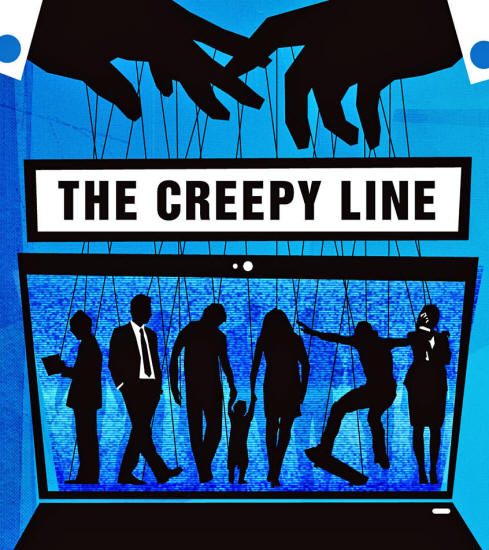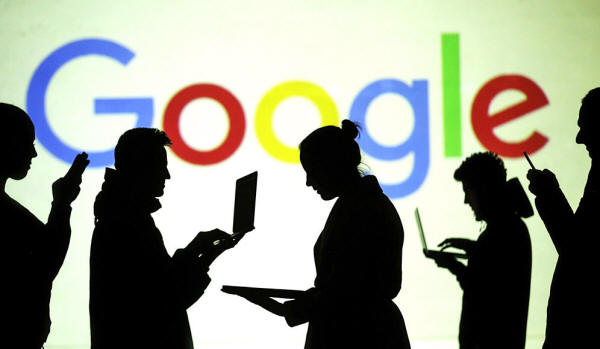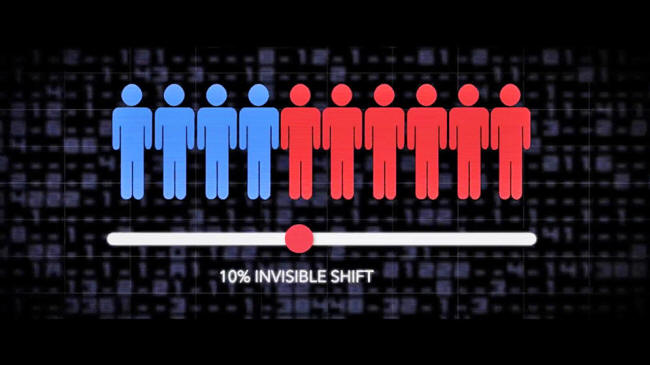|
from MISES Website
It provides an interesting and revealing look at how Google and Facebook influence their users' view of the world, and how the users we often presume to be the customers of these companies aren't really the customers.
The users are, in fact,
the product being sold to third parties.
In truth, though, by pioneering the "surveillance business model," Google has arguably been stepping over "the creepy line" for years.
Not that this has been
much of a problem for the company. Few users seem motivated to stop
using Google products.
The Surveillance
Model
This can be done if a
company can find cheap and easy ways to collect information on the
consumers advertisers wish to target. Successful tech giants can
offer this data - and huge amounts of it.
Over the past 20 years,
Google and Facebook have perfected the art of convincing
users to trade online services for their personal data. And the
companies' capabilities have expanded with time.
Users had to use Google's
site in order to be tracked. This limited the information Google
could collect. Eventually, though, Google - inspired in part by
Apple - figured out it could track its users more fully by
developing its own internet browser, and then developing its own
computing devices.
But whether or not one
uses Facebook on a smart phone, the company collects data on every
user's friends, his posts, his comments, and his instant messages.
The real customers are
the advertisers who use Facebook and Google for targeted
advertising. The users are just the ones who give Google and
Facebook something to sell.
In all of these cases, though, the viewers/users are part of the process that produces the final product.
They don't consume the final product. In broadcast television and radio, for example, the television shows and radio broadcasts are only there to keep the viewer around long enough to see the commercials.
If the programming is successful, then the "ratings" are high and the content providers can charge more for advertising. In other words, NBC does not exist to create television programming. It exists to make money through ad sales.
The TV shows themselves
are only something NBC uses to increase ad sales. TV networks would
run a blank screen for 22 minutes every half hour if they thought it
would bring in more viewers for advertisements.
The users are helping
create the product...
It makes the user a
supplier, just as a lumber yard is a supplier that makes it possible
for a carpenter to sell this wares.
The users aren't the customers, and the profitability of Google and Facebook doesn't fundamentally rest on what the users do.
What really matters is that Google and Facebook can continue to extract data from enough people so as to sell a product to advertisers.
Surely, this will require Facebook and Google to keep up the appearance of wishing to "serve" the people who hand over their personal data. But in a world of such immense amounts of data, many users are expendable.
And this is why companies like Google and Facebook have few scruples about banishing even popular users like Alex Jones or other controversial pundits and content creators.
Those people aren't the customers.
What really matters is the ad revenue...
In many cases, the services traded for personal data take the form of search results and the news feeds that many users have come to rely on. This then brings us to another way Google and Facebook insinuate their company policies and views into our daily lives.
By creating the software
behind search results and new feeds, the owners and employees of
these companies decide what information users consume.
After all, publishers
throughout history have controlled what information is presented.
Book authors, newspaper editors, and television producers control
what information the viewers and readers are allowed to see.
The editors choose which
letters the readers see...
This means that Google
has tremendous power in deciding what information is seen by the
overwhelming majority of people performing web searches.
If the past is any indicator:
After all, historically, most people have been content to consume whatever the newspapers tell them is the news. They consume whatever is on the evening news - whatever's convenient.
They believe whatever
Walter Cronkite tells them...
The novelty of Google and
Facebook is that they have taken convenience to a whole new level.
Manipulating
Ideology, Rigging Elections?
The fact that the
director, M.A. Taylor, also made the anti-Clinton
documentary,
Clinton Cash,
suggests to
some reviewers that the documentary
primarily exists to push a narrative in which tech giants are
manipulating the public to support Democratic candidates.
It's likely that the
filmmakers felt the film needed to make a very explicit and forceful
political point to be seen as relevant or compelling. In some ways,
though, this last section of the film gives the appearance that the
filmmakers were trying too hard to "bring it home."
In spite of the fact that
the World Wide Web offers an immense variety of sources of news,
research, and opinion, most users of media are content to let others
be the last word in selecting the news they consume.
It appears the voters are content to let themselves be manipulated. They could seek out news sources other than CNN or Google News or their Facebook news feed.
Many simply choose not
to...
|




